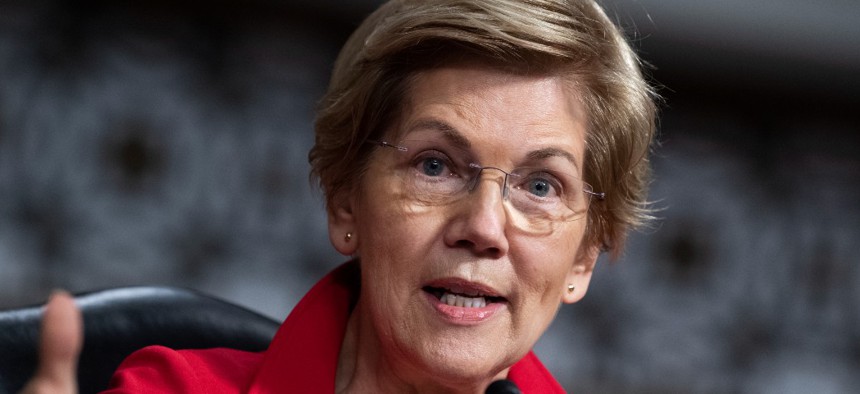Warren Spearheads Crypto Sanctions Against Russia With New Bill

Sen. Elizabeth Warren, D-Mass., speaks during the Senate Armed Services Committee hearing on security in Afghanistan and in the regions of South and Central Asia, in Dirksen Building on Tuesday, October 26, 2021. Tom Williams/CQ-Roll Call, Inc via Getty Images
Democratic Senators aim to regulate international digital asset transactions to prevent Russian actors from evading sanctions amid war with Ukraine.
A coalition of Democratic Senators introduced a novel piece of legislation on Thursday that imposes restrictions on cryptocurrency transactions in a bid to prevent Russian state actors from circumventing sanctions imposed on the country by the U.S. government.
Sponsored by Sens. Elizabeth Warren, D-Mass., Jack Reed, D-R.I., Mark Warner, D-Va., and Jon Tester, D-Mont., the Digital Asset Sanctions Compliance Enhancement Act would require President Biden to issue a report to Congress identifying foreign persons trading or operating a cryptocurrency trading platform to evade U.S. sanctions, and to subsequently freeze their assets.
The bill further grants extensive powers to the U.S. Secretary of the Treasury, including the authority to restrict digital asset and cryptocurrency trading platforms from engaging with users who are potentially linked to Russia.
This is the latest piece of legislation issued in the wake of Russia’s military assault on Ukraine, and responds to concern that Russian oligarchs stand to evade stringent international sanctions through cryptocurrency and digital asset trading.
“Putin and his cronies can move, store and hide their wealth using cryptocurrencies, potentially allowing them to evade the historic economic sanctions the U.S. and its partners across the world have levied in response to Russia’s war against Ukraine,” Warren said. “I'm glad to introduce the Digital Asset Sanctions Compliance Enhancement Act with my colleagues to strengthen our sanctions program and close off any avenues for Russian evasion.”
The bill also requires individuals who execute a digital asset transaction worth over $10,000 to one or more accounts outside of the U.S. to report to the Treasury Department’s Financial Crimes Enforcement Network.
It also directs officials at the Treasury Department to issue reports to designated congressional committees on the implementation of the bill’s provisions and make a publicly-available list of online trading platforms that are at a high risk for individuals to use to evade sanctions.
“A sanctions system without strong authorities to limit evasion using digital assets is like having a security system but leaving the front door open. This bill would clarify Treasury’s authorities and strengthen our sanctions on Putin and his enablers,” Reed said in the press release.
Warren announced the bill’s development last week on NBC News, saying that Congress needs to closely monitor the loopholes digital assets and cryptocurrencies pose in the standard banking system.
“What I'm proposing and some other senators are working on right now is to authorize the president to say ‘any of these exchanges that are not following through on economic sanctions against the oligarchs, against Russia, can't do business in the United States,’” she commented.
She noted that her legislation will focus on the exchanges and the crypto trading platforms, referencing that other countries like North Korea and Iran have been evading sanction by storing money in cryptocurrencies.
“It's time for us not just to push back against formal banking but also against crypto on this issue,” Warren said.






